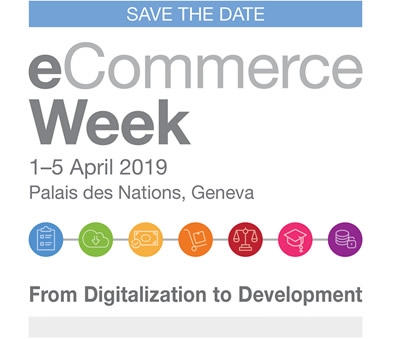Growing trust deficits online: Implications and responses
1 Apr 2019 11:30h - 13:00h
Event report
[Read more session reports and live updates from the UNCTAD E-commerce Week]
The moderator, Mr Fen Hampson (Director of Global Security & Politics, Centre for International Governance Innovation (CIGI)), introduced the panellists and the session which summarised where the world currently stands in terms of trusting the Internet, and how countries should proceed in regulating the digital economy. Consumers continue to be hesitant toward the Internet, according to a significant CIGI study which polled over 25 000 Internet users in 25 economies regarding trust of e-commerce services.
Mr Torbjorn Fredriksson (Chief, ICT Policy Section, UNCTAD) spoke about the data that indicated differentiation in trust patterns when comparing developed and developing countries. It was found that more and more Internet users want their respective governments to play a greater role in protecting their data. While users in India, Indonesia, Hong Kong, and Egypt are satisfied, those in more developed countries, like the United States, France and Japan, are not. There is a desire for more regulation since the current governing environment is fragmented, and many are unaware of what measures are already in place. Additionally, in developing countries there is a lack of a legal framework, affordable technology, and skills to understand the implications of trust in data, which hinders their ability to fully participate in the digital economy.
Mr Konstantinos Komaitis (Senior Director, Policy Development and Strategy, Internet Society) addressed the issue of data localisation. He outlined the idea of localising data, or restricting the free flow of data, within a country to protect it. Komaitis explained that forcing the localisation of data is contradictory for three reasons. First, localisation opposes the very purpose of the Internet, since it would not be global, and the Internet is fundamentally built for worldwide use. Second, government intervention tends to be biased. Finally, there can be a fallacy of introducing data localisation to strengthen privacy and security, which is currently unattainable due to lack of successful protecting regulations. Komaitis says that although the tendency for governments to force data is justifiable, they need to refrain.
Ms Kimberley Botwright (Community Lead, Global Trade and Investment at the World Economic Forum (WEF)) utilised data to show the lack of confidence consumers feel while shopping at an online market compared to a physical one. She believes that there is still room to grow in creating regulations that make consumers feel safe, not only in their home country, but worldwide. She laid out four concepts that regulations need to address in order to be successful: creating relevant online protection tools, providing personal data protection, addressing the variation in rule, and finally, increasing international co-operation and reducing variance across the board. We need to raise the regulatory system as a whole worldwide, as well as in individual countries.
Mr Eric Jardine (Assistant Professor at Virginia Tech, CIGI Fellow) addressed the fallout of trust by utilising a survey indicating that 26% of consumers limit the applications they use to protect their data, and 18% of the lack of trust means they stop using the Internet. The top sources of mistrust in the Internet are due to the idea that the elite and government control it. He concluded by saying that 66% of people do not trust the Internet because they believe it is not regulated enough, indicating that we need more regulation.
The session ended with a few ideas on how to proceed. Hampson suggested that regulation is not the only option for building trust. Applications already exist that provide review on the legitimacy of a website. In response to a posed question, there was a discussion on creating an international trust mark that would indicate if an online company is trustworthy. The panellists concluded by announcing opportunities for discussion later in the week on how developing countries may improve their presence and regulations in the digital realm.
By Nathalie Meyer
Related topics
Related event

eCommerce Week 2019: From Digitalization to Development
1 Apr 2019 15:45h - 5 Apr 2019 15:45h
Geneva, Switzerland
